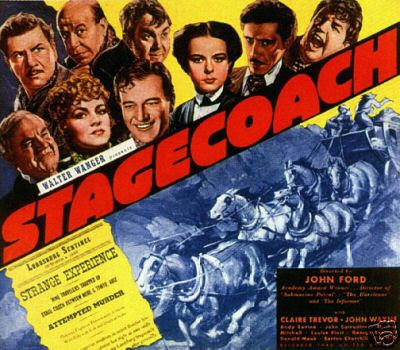1) Relate what was
discussed in class or the text to the screening.
In the late 30s and
early 40s some of the best films of all time were made. This time period would
be remembered as the greatest time period in film history, and one of the most
important films made in this time is Stagecoach, directed by one of the most iconic
film makers, John Ford. Stagecoach is known for revitalizing the western genre,
which at the time was thought to be boring. The film is about a group of people
from all walks of life are traveling from Tonto to Lordsburg. The stagecoach
was a metaphor for society, and each passenger represented a different role in society.
The passengers included a banker, a sheriff, a salesman, a gambler, a
prostitute, a doctor, a wife, a stage driver, and an outlaw.

2) Find a related article and summarize the
content.
http://www.decentfilms.com/reviews/stagecoach
“Still, there is
subtlety and nuance in the way Stagecoach develops its characters and their
story-arcs. It may respect the dissolute gambler Hatfield to a point for his
vestigial courtliness and sense of honor, but it pointedly contrasts Hatfield’s
high-handed disdain for the individual of the lowest social standing, Dallas… Later,
Hatfield makes a sickening decision at a critical moment that, however well
intended, permanently alters our perception of the character.”
In Steven D. Greydanus’
review of stagecoach, he brings up the character of the gambler named,
Hatfield. In the movie, Hatfield is portrayed as a southern gentleman. He shows
his nature when he acts honorable toward the wife. However, he doesn't treat
the prostitute, Dallas and the “critical moment” Steven refers to, is regarding
a scene where the stagecoach gets attacked by Indians, Hatfield sticks a
revolver to the wife’s head and with the last bullet, he planned to kill her in
order to save her from what could of happened to her if she was captured. However
just before he pulls the trigger, the stage coach is saved by the army.

3) Apply the article to
the film screened in class.
After reading this
article, I agree and disagree with Steven’s statement that our perception of
Hatfield had been altered. I agree that I had mixed feeling about Hatfield when
he didn't treat Dallas with the same respect as with the wife. However I feel
that Hatfield’s decision to shoot the wife did not make me think less of him,
instead it did the opposite. Hatfield did it out of mercy. At first it does not
seem like it, but this decision that Hatfield made, only made his character
more of a gentleman.
4) Write a critical
analysis of the film

Stagecoach is the movie
that brought western movies back to “A” status; it also legitimized the career
of one of America’s most beloved stars, John Wayne. The characters in the movie
were all memorable; the performances by the actors were top notch as well. Characters
like the alcoholic doctor, the prostitute with the heart of gold, and the
revenge-driven outlaw, make Stagecoach the American classic that it is.
CHECKLIST FOR
PLAGIARISM
1) ( x ) I have not
handed in this assignment for any other class.
2) ( x ) If I reused
any information from other papers I have written for other classes, I clearly
explain that in the paper.
3) ( x ) If I used any
passages word for word, I put quotations around those words, or used
indentation and citation within the text.
4) ( x ) I have not
padded the bibliography. I have used all sources cited in the bibliography in
the text of the paper.
5) ( x ) I have cited
in the bibliography only the pages I personally read.
6) ( x ) I have used
direct quotations only in cases where it could not be stated in another way. I
cited the source within the paper and in the bibliography.
7) ( x ) I did not so
over-use direct quotations that the paper lacks interpretation or originality.
8) ( x ) I checked yes
on steps 1-7 and therefore have been fully transparent about the research and
ideas used in my paper.
Name: Robert
Moroz_____________________________ Date:
10/23/2013____________________________
No comments:
Post a Comment